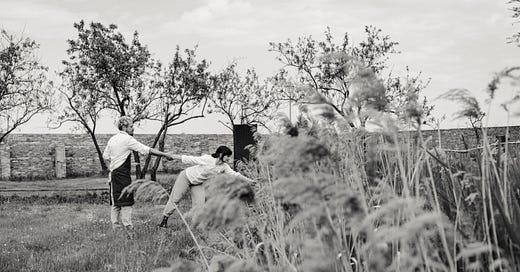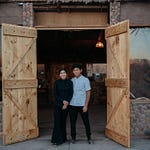Chiara Pavan and Francesco Brutto run a pair of restaurants, a fine dining restaurant and an osteria, at Venissa, a hospitality project on the island of Mazzorbo in Venice, Italy. Mazzorbo is in the northern part of the Venetian lagoon. It’s a small island connected to Burano, another small island with colorful houses where most tourists come on a day trip from the tourist core of Venice. Venissa is home to a small vineyard that contains almost the entire crop of the Dorona di Venezia grape, which is adapted to the salty earth and was rediscovered by Venissa’s owners
Their menu focuses on lesser fish and seafood of the lagoon and Adriatic, which means mostly invasive or overpopulated species, and they have been rallying Venice’s culinary community to do the same and it seems to be having some affect. Venice is a place where the effects of climate change are quite visual, making their story and the way they run their restaurant particularly fascinating. The changing waters have thrown the ecosystem of the lagoon off balance and, even though the city seems fine for now, rising ocean levels threaten its very foundation. Venice is symbolic of a much larger global story.
I’m in love with what they are doing there. It’s the enchantment of the outer islands of Venice, which are almost surreal in their beauty. It’s their restaurants, which are exceptional and delicious, plus they also pour great wines there. It’s the entire vibe, which is relaxed and feels like luxury even though what they are doing is quite confrontational.
-Nicholas Gill
Partial Episode Transcript
On Venice and Climate Change:
Nick: “Venice is often the poster child for climate change. When you think of rising sea waters, you think of Venice. But historically, there has always been rising oceans in Venice. There is the Alta Acqua and there have been great floods like in 1966 that wiped out vineyards and gardens and things. But why is it different now?”
Francesco: “Now, the frequency is becoming higher and higher. The problem has been solved a bit because they put MOSE (Modulo Sperimentale Elettromeccanico, Experimental Electromechanical Module), a system to block the water from the open sea, and the entrance to the lagoon.
Okay. And so, as of acouple of years until 15, 30, 40 years there will be no more acqua alta. The problem is the system was invented in 1993 and it wasn’t ready until 2021”.
Chiara: “After the big flood we had in 2019 they started to use it. Okay, so this system called MOSE was projected in the 1990s.”
Francesco: “But in this period the level of the sea got higher and this big, big, big machine that needs a lot of maintenance will not help, it won’t be useful in a few decades.”
Chiara: “We all know, we all know that the problem of the water that is coming out from the mountains because of the increase of the temperatures is increasing the sea level. It's all over the world, it’s not just Venice, but here is a big problem because the city is built on wood and it is going down. So, the entire city is slowly, slowly, slowly going down and with the high water the process is getting faster.
The water is getting bigger because of the high temperatures and the ice is melting down. That's the problem, but in Venice, it's difficult to understand how we can survive in, I don't know, 100 years. The fact is that the city is going down. And the fact is the water is always higher and higher. With MOSE, this structure they built in the 90s, at this very moment, the problem is a little bit solved. Because it prevents the water of the open sea from coming into the lagoon. So, it has been two years that we haven't seen Acqua Alta because of these structures, but because the level of water always will get higher. Probably in 50 years, this structure, this big monster we see, it will be useless”
Nick: “So what's going to happen?”
Francesco: “We will be dead for sure. So, you know, when people say, Okay, it's a next generation problem? So, our children will have this problem of for sure.”
Nick: “All right. Well, that's, that's depressing.”
Chiara: “The increase of the temperature is because we don't eat properly. Because of the food industry. So, our commitment, what we want to do is to give an idea, an alternative idea of what we should eat, and how we have to behave with the nature around us.”
Nick: “Speaking of the nature around you, the waters are changing. The temperature of the water is changing around Venice. There are different species there that weren't there ever before. When I was there, I kept hearing about invasives and I could see jellyfish in the water, just walking on a pier and things like that. So, you are cooking these things that are invasive and you're trying to create an appetite for these things. And I think a lot of other restaurants in Venice that I went to, everyone's kind of talking about this. Is it adaptation? Or is it trying to get rid of the invasives?”
Francesco: “Both of course. We've try to adapt to the environment that is changing rapidly. And, then, at the same time, we try to help nature fight against this invasion to become the first predictor of those species.”
Chiara: “We are trying to put ourselves on the top of the seafood chain. What is happening is that a lot of traditional species are dying. And a lot of alien species are coming with the ballast of the big boats and are spreading because of the high temperature and because they found a good place to live and reproduce themselves. For example, jellyfish. They feed on the same microorganisms, as the fish. So if there are less fish, they can survive and they can reproduce themselves and there's an open space for them. This year, we really focused on Alien and invasive species because there's a difference. Jellyfish are not an alien. They've always been here, but not many. Instead, there are alien species like blue crab, coming from the Atlantic with the ballast of the big boats. So Rapana venosa, it's Japanese snail.
Francesco: “It comes from the Yellow Sea. So, China and Japan.”
Nick: “It’s like a Whelk, like a big snail.”
Chiara: “And then blue fish and also lemon fish.
Francesco: “That comes from the subtropical area. It comes from the Mediterranean Sea, when the Suez Canal was open.”
Chiara: “We are using a kind of red clam.”
Francesco: “Have you ever tried the bloody clams.?”
Nick: “Yeah, in Latin America, there's quite a bit.”
Francesco: “Yes, they're not supposed to be here.”
Chiara: “So on our menu, you basically find only these kinds of species. So, the menu is divided in a plant based part and invasive species part. So that's what we are doing.”
Francesco: “We are trying to give people a different way of eating to help nature.”
Nick: “I think it's a really important role that chefs have right now, especially with these kinds of things, is teaching people how to eat these species that are kind of overwhelming us. That are aren't in the right place. And just teaching us how to eat what's in our area instead of a package shipped from China or whatever industrial foods coming from who knows where that had been grown in Mexico and processed in Thailand. Just eating what's around us. But most people don't understand what they have around them. And I think by going to a place like your restaurant, they have some awareness of this. And it's really important. I'm not going anywhere else with that. It's just really important.”
Chiara: “And you know what, I think it's working because we've been cooking, for example, blue crab, for three years. And three, four years ago I think we were the first cooking it in Venice. Now, a lot of restaurants are proposing blue crab. It's beginning to have a market.”
Francesco: “We can fight with an army again.”
Nick: “I think it's important to have that mentality because a lot of times, I’m pointing out like specific cases, but in the Gulf of Mexico, there are a lot of lionfish, suddenly. It's always just one chef and one country that's using lionfish, but they're just one restaurant and they're not having any impact whatsoever on the lionfish population from spreading. It's just a marketing gimmick. But if you can have your entire community, have an appetite for these invasives it, I think it can have an impact. If you're sharing knowledge and spreading that, encouraging other people and you're not like guarding the secret of the blue crab, it actually can have an impact. And it takes it takes an army, like you said, and I think that's the total right mentality to have. And it's wonderful.”
Chiara: “We arrived at this kind of awareness after a few years. We arrived in some steps. We started three years ago, cutting down animal proteins. We cut off meat completely from the menu in order to cut down animal proteins and because we are on an island, we could serve a birds, but we decided to send a message and to cut out all meat. Okay, so that was the first step. The second step was we increased our gardens so we could decide what kind of vegetables to grow and employing ancient seeds. We really spent one year figuring out how to how to increase the biodiversity in our garden. So for one year, maybe our menu was more vegetarian than now, because these last two years we focused on the invasive species to start with. There’s was a lot to arrive here at this point.”
Francesco: “Now it's quite an equilibrium.”
Chiara: “A nice balance. We decided to use animal proteins but in this way. So this is what we do in Michelin star restaurant, then with Osteria is not so easy because people want to eat more traditional. I think that tradition is not a problem, but something like a problem.”
Nick: “Explain, explain.”
Chiara: “We are so lucky because we are in Italy and we have wonderful food traditions, also very old traditions, but at the same time, we have to go ahead and try to find new traditions.”
Nick: “You have to adapt. What you're eating is very different than what someone was eating…I mean, the products you get are very different than what someone had 50 or 100 years ago.”
Chiara: “Yeah, that's the that's the point of the message we want to give.”
On Traditional Venetian Cuisine:
Chiara: “We have been working with millet, which used to be traditional in the Venetian Republic. It was a widely used cereal here.
Nick: “Why did it disappear?”
Chiara: “Because of the culture.”
Francesco: “Because it's not so good to eat [laughs]. In the end of the Serenissima Republic, millet saved the Republic from an invasion made by the Genoa Republic. They don't have food anymore in the city center of Venice, they milled it and they started to eat millet from breakfast to lunch to dinner and they saved themselves and they won against Genoa at the time. And so it was very important and we are trying to use it again.”
Chiara: “We've been trying to use it again. We did millet tempeh because it's full of proteins. It probably arrived with Romans because it comes from Africa, then it was very popular in the French Republic. Now it's not used anymore.”
Nick: “So, at least in my mind, the traditional cuisine of Venice is not quite so traditional in the sense that, like elsewhere in Italy, where there's a Nonna making pasta and all these things. I feel like it's always changing and always evolving. And just like the amount of spices and things that passed through historically, and just all the trade and all of these things, beinf a nexus point for all these idea. I mean, is that right? Am I incorrect? Or is there some kind of traditional cuisine that dates back 1000 years?”
Francesco: “It's correct. There was a huge amount of product that was traditionally used, but they actually changed over time and some things disappeared. In the resurgimiento, there were a lot of oysters. Wild oysters.”
Chiara: “This was in the 700s. At the end of the 700s oysters were so popular here. People were crazy for oysters. And they just ate all the oysters and the Venetian oysters disappeared. There is a history about Venetian culinary products, but recipes changed a lot because products. The tendency of products changed a lot. There are a lot of books about that. For example, the rich people in the Republic they didn't used to eat fish. They preferred eating meat. The Venetian Republic was not just Venice but was also the mountains around and they preferred to eat meat. There are some popular recipes that came with fish, but now we don't eat meat.”
Francesco: “For example, the fish that that they loved to eat came from Alexandria, Egypt. It was a sturgeon.”
Chiara: “Or dried lamb coming in from Croatia, what is now the east coast of Croatia.”
Francesco: “It was a curiosity for exotic products because Venice was a very, very fancy place.”
Chiara: “For many centuries they were very rich. So, they had products from abroad, and they ate meat. Fish was only for fishermen, for feeding the poor. But what we want to eat now is fish. So what we mean with tradition in dining, is fish, but the mission changed a lot. So that's why we don't have recipes like in Piedmont recipes. We have Sarde in Saor (Marinated Sardines), which is what the sailors used to eat when they when they were out at sea. We have these kinds of recipes. But you said it well, there are not so many recipes like in Emilia Romagna, or in Piedmont. It's interesting, but at the same time, it's a little bit confused. It's like there are different levels of tradition in Venice.”
Nick: “I think it's very symbolic of the of the whole world right now. People with enough money to buy the easy food from somewhere else. Just because food has gotten so cheap, very cheap, at least in cost to the wallet but not in the environment. But it's become so cheap that we always want the fillet. We always want the whatever's from somewhere far away. And maybe that mentality started in Venice, just because it was the point where everyone got so wealthy and because of trading and commerce and all of these things. It's fascinating that you two are doing the exact opposite right now.”
Quotes from this interview have been gently edited for context and clarity.














Share this post